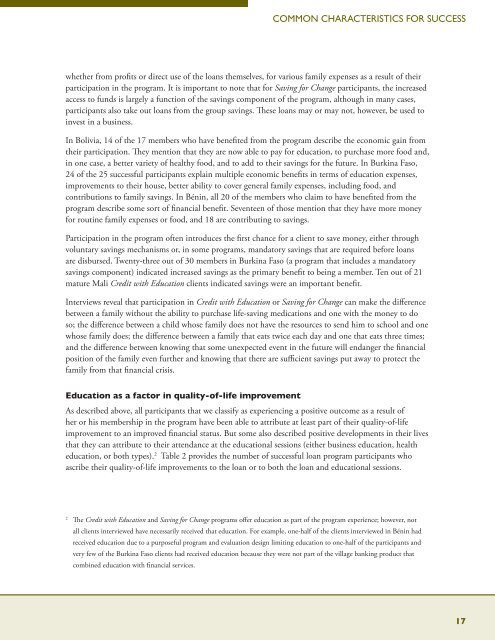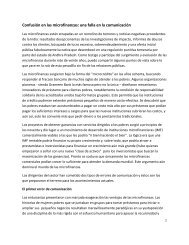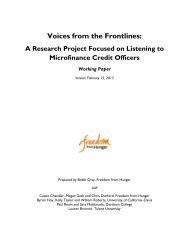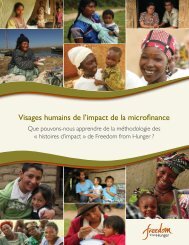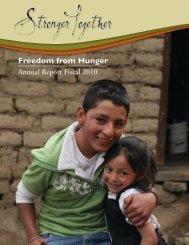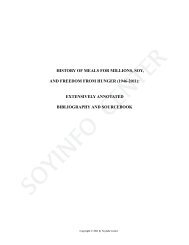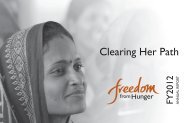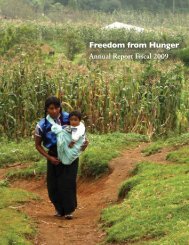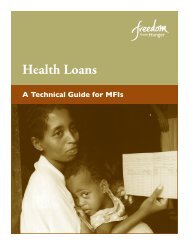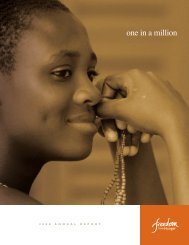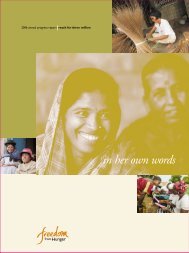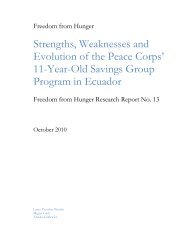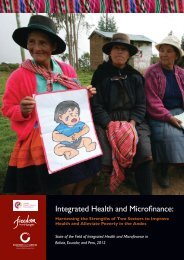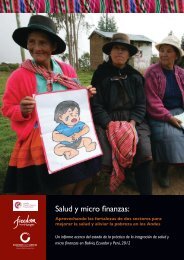English - Freedom from Hunger
English - Freedom from Hunger
English - Freedom from Hunger
You also want an ePaper? Increase the reach of your titles
YUMPU automatically turns print PDFs into web optimized ePapers that Google loves.
CoMMon CHaRaCTeRIsTICs FoR suCCess<br />
whether <strong>from</strong> profits or direct use of the loans themselves, for various family expenses as a result of their<br />
participation in the program. It is important to note that for Saving for Change participants, the increased<br />
access to funds is largely a function of the savings component of the program, although in many cases,<br />
participants also take out loans <strong>from</strong> the group savings. These loans may or may not, however, be used to<br />
invest in a business.<br />
In Bolivia, 14 of the 17 members who have benefited <strong>from</strong> the program describe the economic gain <strong>from</strong><br />
their participation. They mention that they are now able to pay for education, to purchase more food and,<br />
in one case, a better variety of healthy food, and to add to their savings for the future. In Burkina Faso,<br />
24 of the 25 successful participants explain multiple economic benefits in terms of education expenses,<br />
improvements to their house, better ability to cover general family expenses, including food, and<br />
contributions to family savings. In Bénin, all 20 of the members who claim to have benefited <strong>from</strong> the<br />
program describe some sort of financial benefit. Seventeen of those mention that they have more money<br />
for routine family expenses or food, and 18 are contributing to savings.<br />
Participation in the program often introduces the first chance for a client to save money, either through<br />
voluntary savings mechanisms or, in some programs, mandatory savings that are required before loans<br />
are disbursed. Twenty-three out of 30 members in Burkina Faso (a program that includes a mandatory<br />
savings component) indicated increased savings as the primary benefit to being a member. Ten out of 21<br />
mature Mali Credit with Education clients indicated savings were an important benefit.<br />
Interviews reveal that participation in Credit with Education or Saving for Change can make the difference<br />
between a family without the ability to purchase life-saving medications and one with the money to do<br />
so; the difference between a child whose family does not have the resources to send him to school and one<br />
whose family does; the difference between a family that eats twice each day and one that eats three times;<br />
and the difference between knowing that some unexpected event in the future will endanger the financial<br />
position of the family even further and knowing that there are sufficient savings put away to protect the<br />
family <strong>from</strong> that financial crisis.<br />
Education as a factor in quality-of-life improvement<br />
As described above, all participants that we classify as experiencing a positive outcome as a result of<br />
her or his membership in the program have been able to attribute at least part of their quality-of-life<br />
improvement to an improved financial status. But some also described positive developments in their lives<br />
that they can attribute to their attendance at the educational sessions (either business education, health<br />
education, or both types). 2 Table 2 provides the number of successful loan program participants who<br />
ascribe their quality-of-life improvements to the loan or to both the loan and educational sessions.<br />
2 The Credit with Education and Saving for Change programs offer education as part of the program experience; however, not<br />
all clients interviewed have necessarily received that education. For example, one-half of the clients interviewed in Bénin had<br />
received education due to a purposeful program and evaluation design limiting education to one-half of the participants and<br />
very few of the Burkina Faso clients had received education because they were not part of the village banking product that<br />
combined education with financial services.<br />
17


